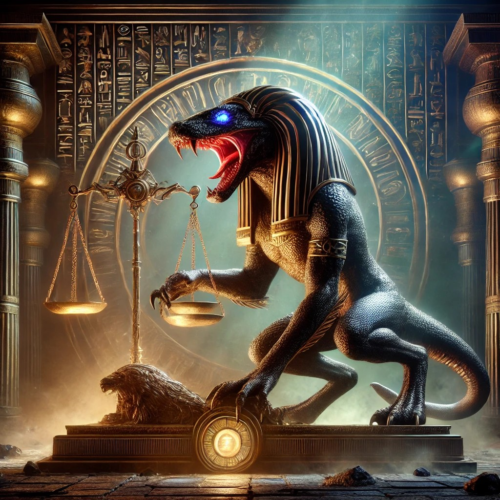Ammit, also known as Ammut or Ahemait, is a fearsome entity from ancient Egyptian mythology, depicted with the head of a crocodile, the forelimbs of a lion, and the hindquarters of a hippopotamus. These three animals, among the most dangerous creatures in the Nile region, symbolize her connection to the natural world’s power and ferocity. Known as “The Devourer” or “She Who Eats,” Ammit is not a deity worshiped in temples but rather a personification of judgment and retribution in the afterlife.
Role in the Afterlife
Ammit’s primary function is to serve as the ultimate arbiter of souls deemed unworthy in the Egyptian underworld, or Duat. During the “Weighing of the Heart” ceremony, the deceased’s heart is placed on a scale. Here it is balanced against the feather of Ma’at, the goddess of truth and cosmic order. Anubis, the jackal-headed god of mummification and the afterlife, oversees this process, while Thoth, the ibis-headed god of wisdom, records the results.
If a heart weighs heavier than the feather—indicating a life of sin and imbalance—it is handed over to Ammit. In a gruesome act of divine justice, she devours the corrupted heart, obliterating the soul’s chance of immortality and condemning it to eternal unrest. Ammit’s role is vital to maintaining Ma’at, as her actions deter chaos and immorality in the mortal realm.

Symbolism and Iconography
Ammit’s appearance embodies ultimate punishment and destruction. Each part of her hybrid form—the crocodile, lion, and hippopotamus—represents lethal strength and power, reflecting her role as the enforcer of cosmic justice. She is often depicted crouched near the scales of justice, ready to devour the unworthy. While she resides in the Duat, her presence looms as a warning to all Egyptians to live a virtuous and balanced life.
Misunderstood Monster
Unlike deities who grant blessings or offer protection, Ammit is not worshipped or honored in temples. Her fearsome reputation makes her a unique figure in Egyptian mythology—she is both a servant of justice and a terror of the afterlife. Her presence reinforces the moral code of ancient Egypt, ensuring that divine order prevails both in life and death.
Ammit’s title as the “Devourer of Souls” cements her role as an enforcer of accountability. Those who fail to adhere to Ma’at are doomed to face her wrath, making her an eternal guardian against chaos. Yet, her existence also underscores the Egyptians’ deep belief in redemption and balance: only the wicked meet her jaws.
